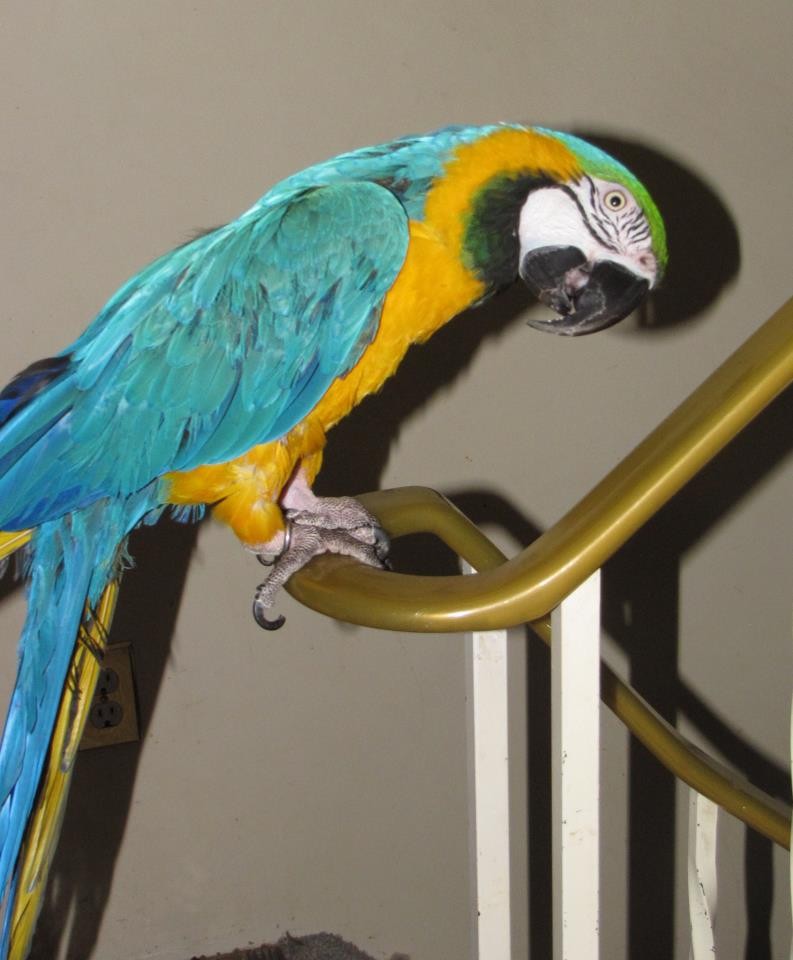Blue and Gold Macaws, with their striking plumage and intelligent eyes, are arguably the most iconic of the large parrot species. Globally recognized for their beauty and often portrayed in popular culture, these birds frequently capture the hearts of those seeking a vibrant and interactive pet. If you’re considering welcoming one of these magnificent creatures into your home, a crucial question arises: Are Blue And Gold Macaws Good Pets? This comprehensive guide delves into the realities of macaw ownership, exploring their temperament, needs, and the commitment involved in caring for these extraordinary birds, helping you determine if a Blue and Gold Macaw is the right companion for you.
Understanding the Wild Nature of Blue and Gold Macaws
To truly appreciate what it means to keep a Blue and Gold Macaw as a pet, it’s essential to understand their origins and natural behaviors. Native to the lowland habitats of northern South America and southern Panama, these macaws are a quintessential parrot – large, bold, colorful, and known for their vocalizations. In their wild environment, they thrive in diverse landscapes, even adapting to urban parks, showcasing their adaptability and intelligence. Their diet in the wild consists of a variety of fruits, nuts, and seeds, which they expertly crack open with their powerful beaks, a testament to the strength they possess.
Social creatures by nature, wild Blue and Gold Macaws are often observed in small flocks. Outside of the breeding season, they commonly roost together in groups, fostering a strong sense of community. Even within these flocks, the bonds between breeding pairs are evident, with mated birds consistently flying and feeding in close proximity. This inherent social nature highlights a key aspect of their well-being – the need for interaction and companionship, which translates directly into their needs as pets.
Blue and Gold Macaws as Companions: Navigating the Realities
When considering “are blue and gold macaws good pets?”, it’s vital to move beyond their captivating appearance and delve into the practicalities of macaw ownership. Blue and Gold Macaws have the potential to be phenomenal companions, but they can also present significant challenges if an owner is unprepared for their specific needs. Often labeled as high-maintenance pets, this reputation stems from their considerable size, powerful vocalizations, and the sheer strength of their beaks. Success in keeping a macaw hinges on realistic expectations and a commitment to meeting their complex requirements.
The Cage and Beyond: Housing Your Macaw
Due to their intelligence, curiosity, and powerful beaks, Blue and Gold Macaws cannot be allowed to roam unsupervised within a home. Providing a secure and spacious cage is paramount, often representing a substantial initial investment, potentially costing $1000 or more for a suitable macaw enclosure. However, it’s crucial to emphasize that a cage should never be a permanent confinement. Macaws require ample time outside their cages for physical activity and social interaction. Therefore, investing in parrot stands, ideally multiple and strategically placed throughout the home, becomes essential. These stands serve as perches and activity centers when the macaw is outside its cage. For those able to provide it, an outdoor cage or aviary offers an enriched environment, allowing for natural sunlight and fresh air.
Despite designated areas, macaws are naturally inquisitive and may explore their surroundings. Owners must be prepared for this and proactively manage potential hazards. Providing appropriate outlets for their chewing instincts is crucial, as is redirecting them from inappropriate targets like furniture or walls.
The Chewing Imperative: Satisfying Natural Instincts
Chewing is not merely a pastime for macaws; it’s a fundamental need rooted in their biology. Their beaks are designed for powerful manipulation, and chewing helps maintain beak health and provides mental stimulation. Providing a constant supply of safe and appropriate chew toys is therefore non-negotiable. While commercially available macaw toys exist, they can be expensive, especially considering their intended purpose is destruction. Many macaw owners find success and cost-effectiveness in utilizing natural, untreated items like wood pieces, pine cones, and sturdy baskets as chew toys. It’s vital to ensure that any natural items are non-toxic and free from pesticides or contaminants.
Vocalizations and Communication: More Than Just Talking
Blue and Gold Macaws are renowned for their talking abilities, often becoming proficient in mimicking human speech. While this can be an entertaining aspect of macaw ownership, it’s crucial to understand that talking is only one facet of their vocal repertoire. Macaws are naturally vocal birds, communicating through a range of sounds, including loud screeches and squawks. These vocalizations are a normal part of their behavior and serve various purposes, from expressing excitement to signaling distress.
While training and behavioral modification techniques can help manage and minimize excessive vocalizations, it’s unrealistic to expect a macaw to be a quiet pet. Prospective owners must be prepared for the inherent noise levels associated with macaw ownership. Focusing solely on a macaw’s potential to talk can lead to disappointment, as not all macaws become proficient talkers, and even those that do will still engage in their natural vocalizations. The novelty of a talking bird can quickly fade if the owner is unprepared for the broader spectrum of macaw sounds.
The Mess Factor: Embracing the Inevitable
Macaws, along with cockatoos, are known for being among the messiest pet birds. This isn’t simply about droppings, which are naturally a part of bird ownership. Macaws are also messy eaters and can be quite untidy with their toys. Their powerful beaks are adept at breaking down food and toys, resulting in scattered debris around their cage and play areas. Providing foods in the shell, like nuts, while enriching, also contributes to the mess as shells are inevitably discarded. Regular cleaning around a macaw’s cage and play areas is a constant requirement for macaw owners.
The Beak: Respecting Its Power
The formidable beak of a macaw can be intimidating, and rightfully so. These beaks are incredibly strong, capable of cracking open the toughest nuts with ease. A macaw bite can be painful and inflict significant injury. However, macaw bites are often preventable with understanding and respectful handling. Macaws typically provide clear warning signals before resorting to biting. Observing their body language is key – signs of agitation include lowering the head, pinning pupils, and raising head feathers. Respecting these signals and avoiding interaction when a macaw displays them is crucial for preventing bites.
Training from a young age, using positive reinforcement techniques, plays a vital role in establishing a trusting relationship and minimizing biting behavior. Training a macaw to “step up” onto a hand or perch facilitates handling and reduces the likelihood of bites. Furthermore, socializing a macaw with multiple people from a young age helps prevent them from becoming a “one-person bird,” making them more adaptable and less likely to react defensively to unfamiliar individuals. It’s essential for a potential macaw owner to approach these birds with confidence and without fear, as macaws can sense and react negatively to an owner’s apprehension, potentially leading to behavioral issues.
The Social Demands: An Interactive Companion
Macaws are inherently social creatures and thrive on interaction and attention. They are not birds that can be relegated to a cage and ignored for extended periods. They crave companionship and want to be involved in their owner’s lives. A macaw left in isolation will likely become unhappy and may develop behavioral problems. Providing ample interaction, playtime, and mental stimulation is crucial for their well-being. Macaws are intelligent and capable of learning tricks and engaging in interactive play, further enhancing their bond with their owners. They are high-energy, demanding pets that require a significant time commitment from their owners.
Nutritional Needs: Fueling a Macaw’s Health
A balanced diet is fundamental to a Blue and Gold Macaw’s health and longevity. A high-quality pelleted diet formulated specifically for large parrots should form the basis of their nutrition. This should be supplemented with a variety of fresh foods, including fruits, vegetables, nuts, and seeds. Offering a diverse diet ensures they receive a wide range of nutrients and helps prevent nutritional deficiencies. Nuts, while enjoyed by macaws and beneficial in moderation, should be offered in controlled amounts due to their high fat content. Providing a varied and nutritious diet contributes significantly to a macaw’s overall well-being and vitality.
Are Blue and Gold Macaws the Right Pet for You? A Balanced Perspective
So, are blue and gold macaws good pets? The answer is nuanced and depends entirely on individual circumstances and preparedness. Blue and Gold Macaws can be exceptional companions for owners who are:
Well-Suited Owners:
- Experienced bird owners: Prior experience with large parrots or birds in general is highly beneficial.
- Dedicated and committed: Prepared to invest significant time, energy, and resources into macaw care for potentially 50+ years.
- Patient and understanding: Willing to learn macaw communication and behavior, and employ positive reinforcement training methods.
- Financially stable: Able to afford a spacious cage, ongoing food and toy costs, and potential veterinary care.
- Accepting of noise and mess: Tolerant of loud vocalizations and the inherent mess associated with macaw ownership.
- Active and interactive: Able to provide ample daily interaction, playtime, and mental stimulation.
- Living situation appropriate: Have a home environment that can accommodate a large, vocal bird without causing disruption to neighbors or household members.
Less-Suited Owners:
- First-time bird owners: May find the demands of macaw ownership overwhelming without prior bird experience.
- Seeking a quiet or low-maintenance pet: Macaws are neither quiet nor low-maintenance.
- Limited time or resources: Unable to dedicate the necessary time and financial resources to proper macaw care.
- Living in confined spaces: Apartments or homes with close neighbors may not be suitable due to noise levels.
- Unprepared for a long-term commitment: Macaws’ long lifespan requires a lifelong commitment.
- Intimidated by large birds: Fear or intimidation can hinder effective macaw ownership and bonding.
Conclusion: Making an Informed Decision
Blue and Gold Macaws are extraordinary birds with the potential to bring immense joy and companionship to the right owner. However, they are not pets for everyone. Their considerable needs, both behavioral and practical, demand a significant commitment. Thorough research, honest self-assessment, and realistic expectations are crucial before welcoming a Blue and Gold Macaw into your life. If you are prepared for the challenges and rewards of macaw ownership, you may find yourself sharing your life with a truly remarkable and deeply rewarding companion.
Useful Resources:
For further information on macaw care and training, consider exploring these resources:
- The Parrot Problem Solver by Barbara Heidenreich
- Clicker Training for Birds by Melinda Johnson
- Avian Publications: http://www.avianpublications.com/items/macaws/index.htm
By carefully considering all aspects of macaw ownership, you can make an informed decision about whether a Blue and Gold Macaw is indeed a good pet for you and your lifestyle.

